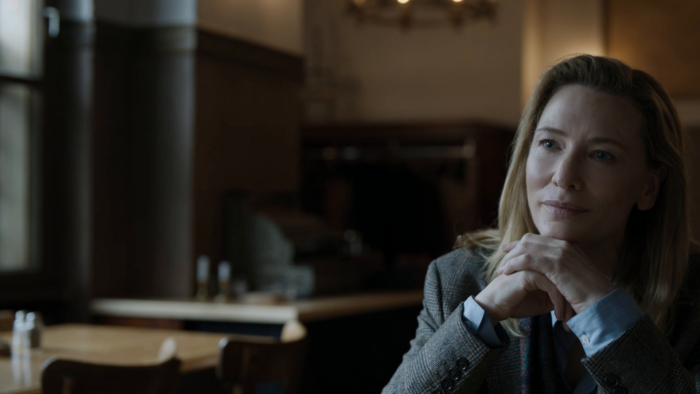VOD film review: Tar
Review Overview
Cate Blanchett
8Lydia Tár
6Intentionally unanswered questions
7David Farnor | On 12, Mar 2023
Director: Todd Field
Cast: Cate Blanchett
Certificate: 15
“It is always the question that involves the listener, it’s never the answer.” Those are the words of conductor extraordinaire Lydia Tár (Cate Blanchett) as she’s interviewed at the beginning of her eponymous portrait by a writer from the New Yorker. She’s talking about conducting, about music, about art, about being an artist in today’s world and, most of all, about herself. It’s a dense conversation that you might well struggle to get through, even if you already have a love of tempo, dynamics and the ins and outs of classical composition. But it’s also a towering statement of authority by both Tár the film and Tár the woman – and when you find yourself struggling to separate the two, that’s when you start to get into the film’s real groove.
We meet Lydia just as she’s at the pinnacle of her career, conducting the Berliner Philharmoniker and preparing to finish a Mahler cycle by recording his fifth symphony. But for all her work to impose her control and vision on to the swirling possibilities of orchestral music, she finds herself in a rapidly escalating spiral – a descent that’s ominously foreshadowed by some dark text message allegations.
Todd Field doesn’t quite spell everything out in his prickly, patient saga, but he lets us piece together enough from his warts-and-all dive into the classical music scene – not since Mozart in the Jungle has the orchestral industry been captured in such frank detail, from the politics of record companies and the professional rivalry of musicians to the power games at play in auditions and the abuse of authority behind closed doors. Rumours of affairs, obsessions and favourites collide with modern moral standards and the transparency of the social media age – Lydia clashing with a young student at Juilliard over whether Bach should be dismissed for ideological reasons is just the start of the prickly confrontations.
The cast are all excellent, helping to foster a sense of unease bubbling underneath the surface. Noémie Merlant gradually dials up the bitterness as Francesca, Lydia’s longtime assistant, while Nina Hoss adds a poignant note to Sharon, Lydia’s longtime partner who never takes priority in her life, and both are suitably upstaged by Sophie Kauer, a young cellist who swans in and steals all of Lydia’s attention. All the while, Mark Strong is deliciously desperate as second fiddle conductor Eliot, who unsubtly longs for Lydia’s success.
But Lydia’s enemy is herself and, while the film sometimes struggles to break down its own artistic walls to invite the audience in, Cate Blanchett fully understands the brief, leaning into Tár’s impenetrable, imperious vibe. She’s so intimidatingly confident that you almost walk away from the film thinking that Lydia Tár is a real person, even if you don’t fully warm to, or grow to care about, her.
Blanchett’s impervious, haughty deadpan gives way to disarray with an astonishing level of precision, seamlessly transitioning from a stubborn genius to someone who pettily plays an accordion at full volume to get back at her neighbours or angrily assaults people onstage mid-concert. It’s a phenomenal powerhouse of a performance, as Lydia forever closes down possible scandals while the film opens up the difficult and timely debate of how – or if – we can separate an artist from their art. Tár offers questions more than answers, but they’re questions that linger on long after its final movement.



















